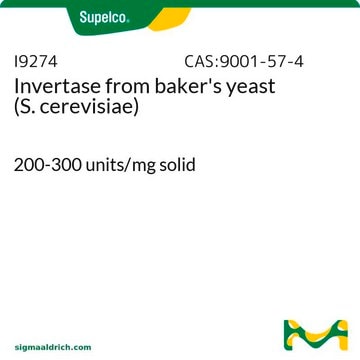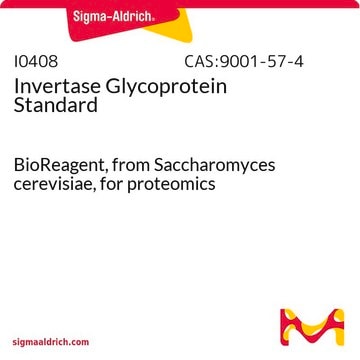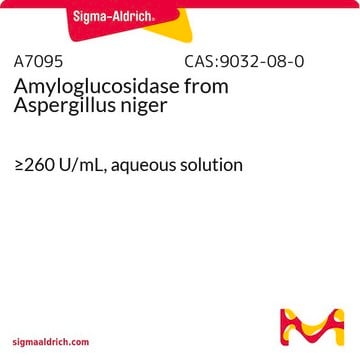I4753
Invertase from Candida utilis
Grade X, ≥300 units/mg solid
Synonyme(s) :
β-D-Fructofuranoside fructohydrolase, β-Fructofuranosidase, Saccharase
About This Item
Produits recommandés
Type
Grade X
Niveau de qualité
Forme
solid
Activité spécifique
≥300 units/mg solid
Poids mol.
~260 kDa
Activité étrangère
α-galactosidase (melibiase), essentially free
Température de stockage
−20°C
Description générale
Application
- as a supplement in YE liquid medium to observe for morphological changes in Streptomyces sp.
- to determine the sucrose content in ethanolic extract of leaf tissues
- to determine the total non-structural carbohydrates (TNC) in root tissues
Actions biochimiques/physiologiques
Propriétés physiques
Structure : Glycoprotein containing ca. 50% of carbohydrates
Optimum pH : 3.5 - 4.0 Optimum temperature : 60 - 70oC
pH Stability : pH 4.0 - 6.0 (50oC, 10min)
Thermal stability : below 60oC (pH 4.5, 10min)
Substrate specificity : The enzyme hydrolyzes saccharose and raffinose, but does not
hydrolyze inulin and melezitose.6)
Définition de l'unité
Notes préparatoires
Mention d'avertissement
Danger
Mentions de danger
Conseils de prudence
Classification des risques
Resp. Sens. 1
Code de la classe de stockage
10 - Combustible liquids
Classe de danger pour l'eau (WGK)
WGK 3
Équipement de protection individuelle
Eyeshields, Gloves, type N95 (US)
Certificats d'analyse (COA)
Recherchez un Certificats d'analyse (COA) en saisissant le numéro de lot du produit. Les numéros de lot figurent sur l'étiquette du produit après les mots "Lot" ou "Batch".
Déjà en possession de ce produit ?
Retrouvez la documentation relative aux produits que vous avez récemment achetés dans la Bibliothèque de documents.
Les clients ont également consulté
Notre équipe de scientifiques dispose d'une expérience dans tous les secteurs de la recherche, notamment en sciences de la vie, science des matériaux, synthèse chimique, chromatographie, analyse et dans de nombreux autres domaines..
Contacter notre Service technique












